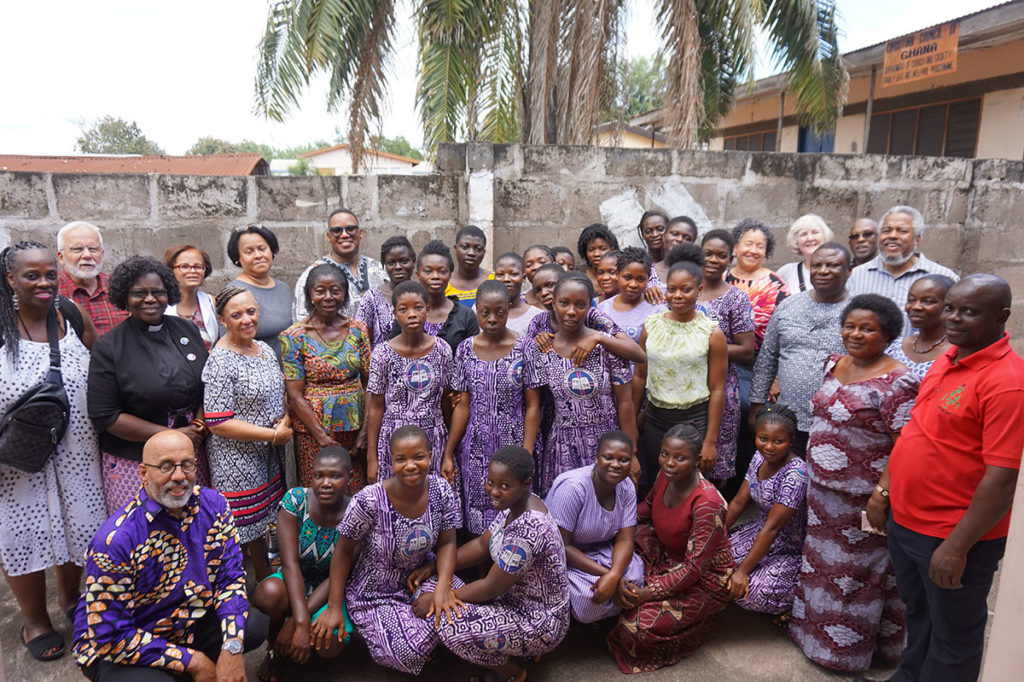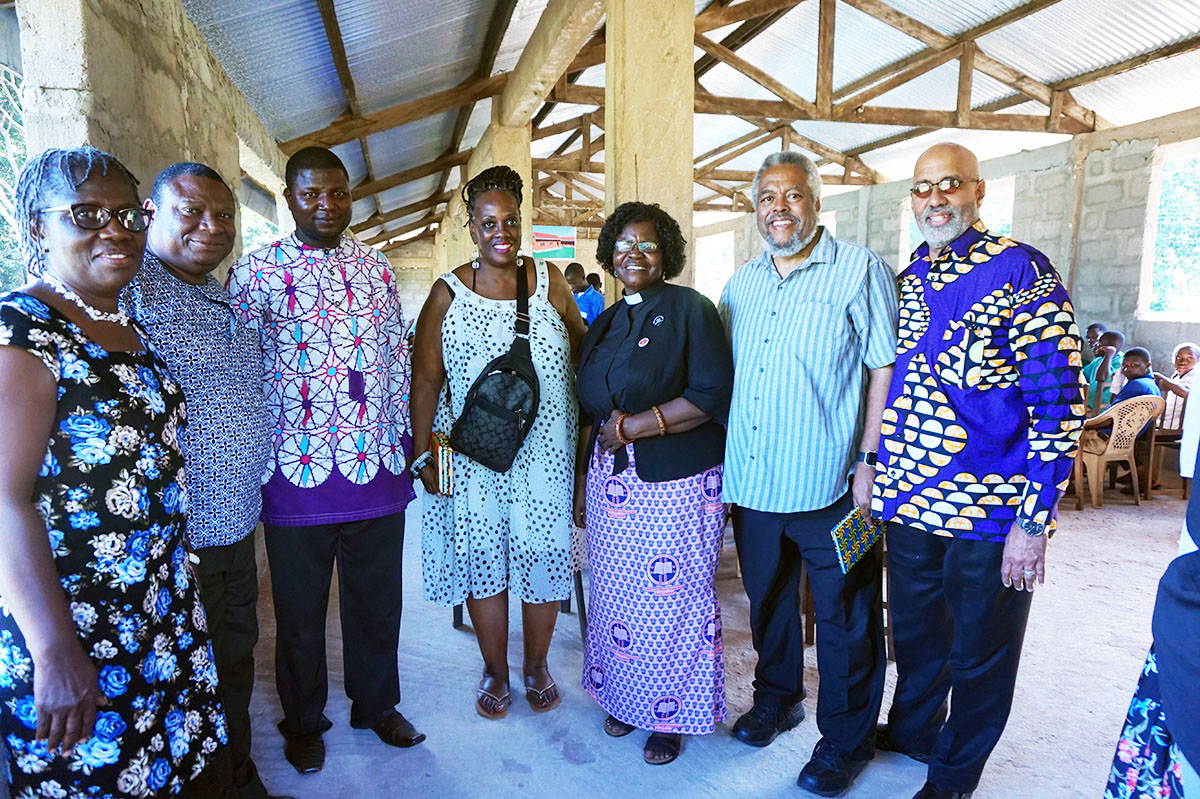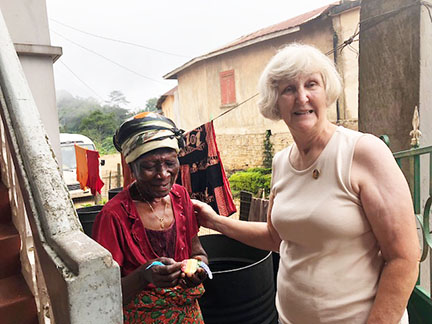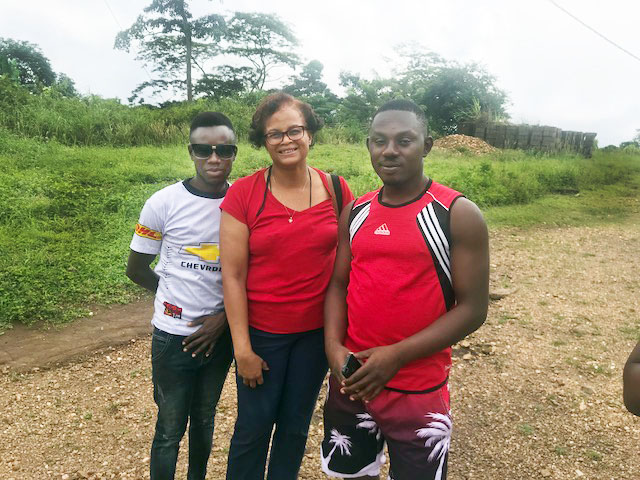OGHS and Global Ministries Delegation to Ghana
Our Pilgrimage to Ghana (September 23 – October 3) was very successful. Our group of 12 learned many things about the work of the United Church of Christ and Christian Church (Disciples of Christ). We met people who work with the projects supported by OGHS and Global Ministries, and we saw first-hand that our caring and our support really does make a world of difference, for we not only saw people surviving, but thriving despite the overwhelming challenges.
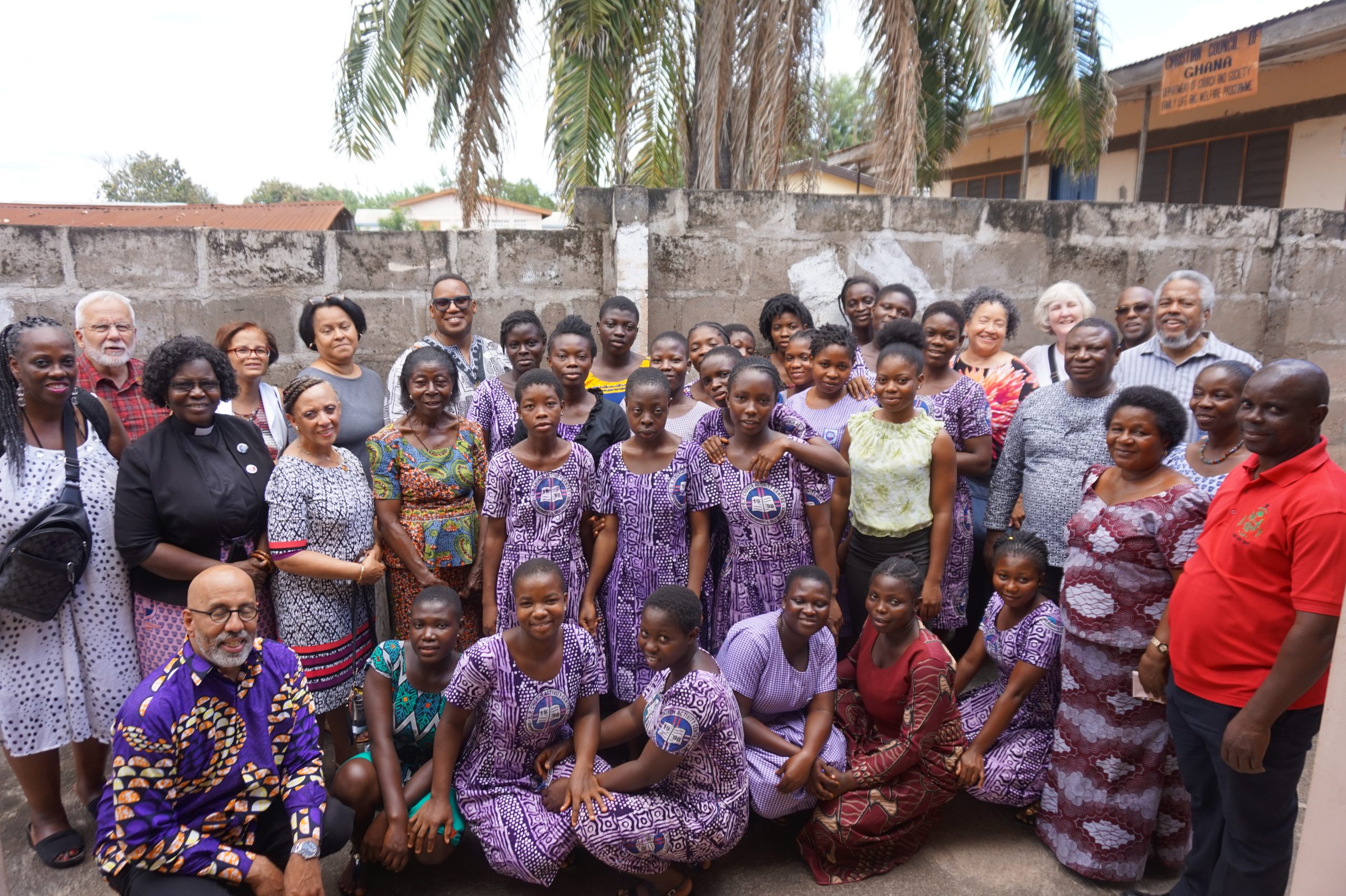
Photo Credit: Joyce Shinn/Mt. Zion UCC, Cleveland, Ohio
The OGHS and Global Ministries delegation to Ghana met for orientation on September 24 to embark on a pilgrimage to Ghana. Included in the 12 person delegation are nine membes of the United Church of Christ and 3 from the Christian Church Disciples of Christ. This trip will focus on partner visits in Ghana related to and supported by One Great Hour of Sharing and Global Ministries (United Church of Christ and the Christian Church Disciples of Christ). Hear first-hand accounts of lives changed because of the support provided by both churches.
During orientation, we learned about the pilgrimage we were about to embark on. We talked about the current refugee crisis, climate change, and local economic environment impact the region. All of these we will hear about along our journey.
Pictured from left to right are Bill Matten, Darryl Trimiew, Audley Mackel, Sharon Mackel, Ellen Matten, Linda Long, Phyllis Richards, Paul Sadler, Kim Sadler, Joyce Shinn, Marco Cable and Lajuana Beasley.
Day 2
Written by Rev Paul Sadler
Photographer, Joyce Shinn
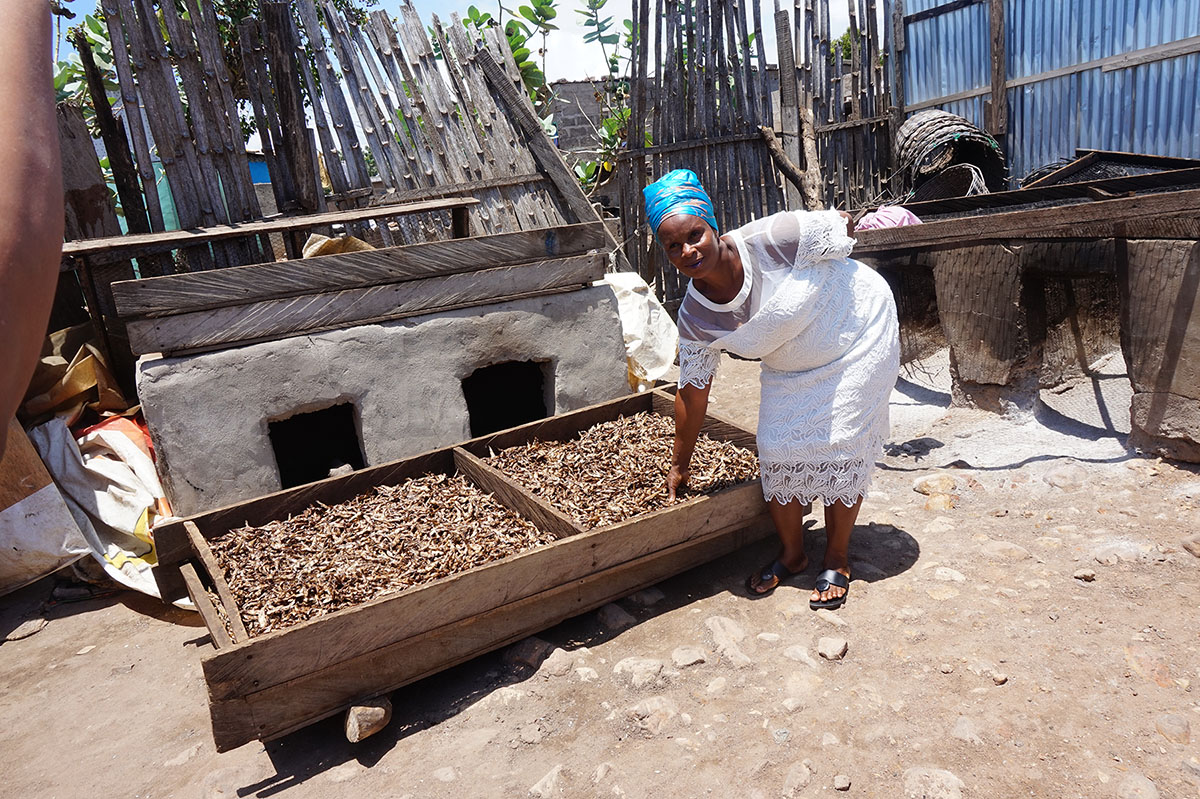 Day two of our journey in Ghana began with breakfast at our hotel at 7:00 am. At 8:30am we travelled by bus journey to a village named Bortianor, Ghana, to visit a women’s micro-credit project there and meet with the women who facilitate it. We began our time with them in the sanctuary of a church in the village. The dialogue with the women was rich and informative. We talked about their needs and challenges in doing the work of smoking fish which they later sell.
Day two of our journey in Ghana began with breakfast at our hotel at 7:00 am. At 8:30am we travelled by bus journey to a village named Bortianor, Ghana, to visit a women’s micro-credit project there and meet with the women who facilitate it. We began our time with them in the sanctuary of a church in the village. The dialogue with the women was rich and informative. We talked about their needs and challenges in doing the work of smoking fish which they later sell.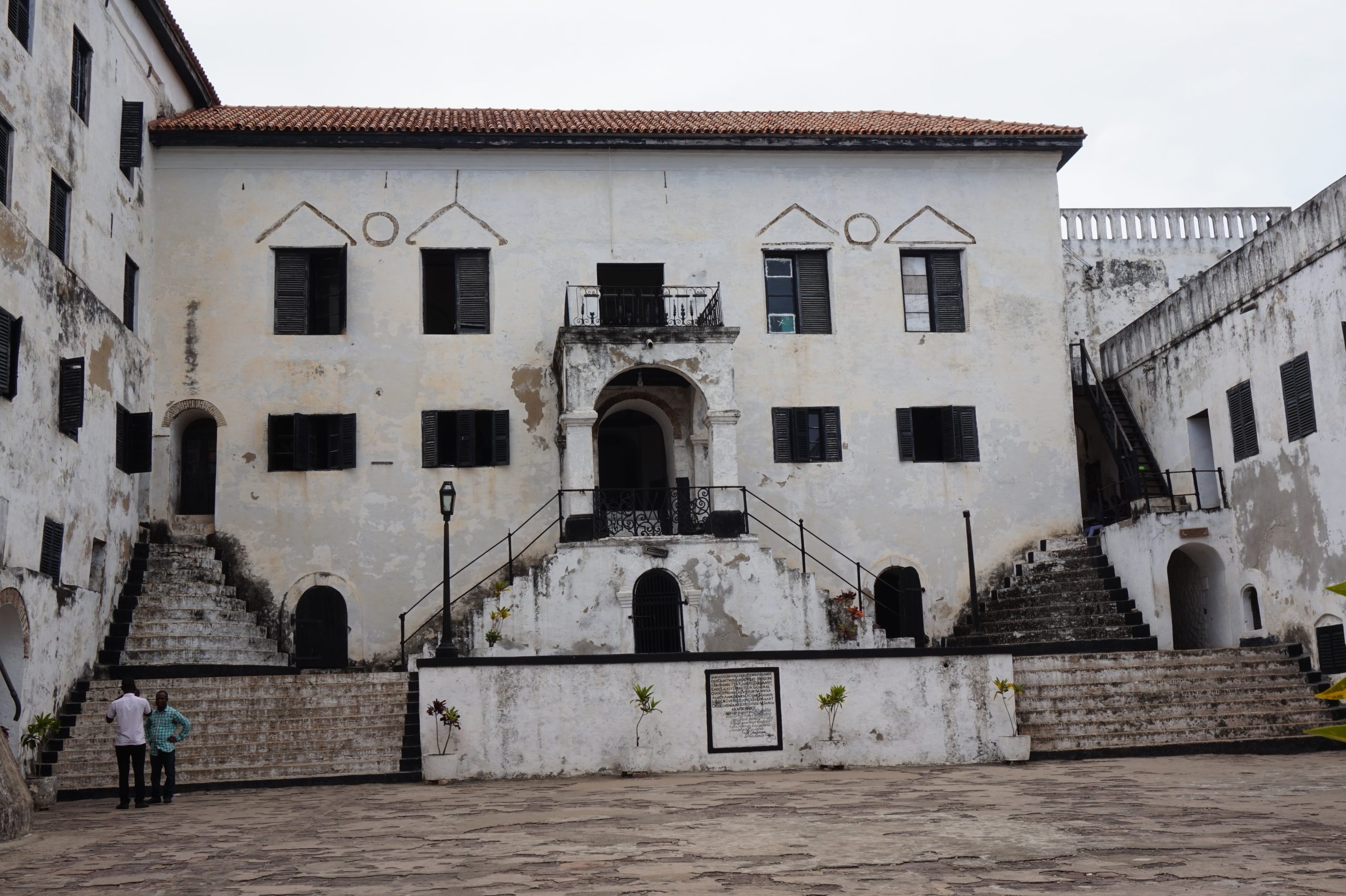 Daunting, the building sat squat on the top of a precipice overlooking the gray green Atlantic. From its parapets one gets a beautiful view of the village and an imposing view of the ocean. As a boy I enjoyed a film, “House on a Haunted Hill.” Its plot centered upon the scaring and killing of all the visitors unwise enough to have visited there-it was a fantasy. This building was not—it was not a house but a fort, reminding me of Cortez’s castle in Cuernavaca, Mexico. There the natives were tortured and killed into submission. Dread descended upon our party as we entered in and reflected upon our ancestors. I heard a sorrow song, from inside me, “Sometimes I feel like a motherless child” sung slow and mournfully. Our guide, told us of the history of slavery with which we are not unfamiliar. Though I had prayed and prepared myself, here I felt and smelt old hopes dying, desperation surging and a smothering resignation over the past. The expanse of the courtyard only emphasized the inhumane cramped confines of the prison cells. Up and down we went forcing ourselves to not feel too much.
Daunting, the building sat squat on the top of a precipice overlooking the gray green Atlantic. From its parapets one gets a beautiful view of the village and an imposing view of the ocean. As a boy I enjoyed a film, “House on a Haunted Hill.” Its plot centered upon the scaring and killing of all the visitors unwise enough to have visited there-it was a fantasy. This building was not—it was not a house but a fort, reminding me of Cortez’s castle in Cuernavaca, Mexico. There the natives were tortured and killed into submission. Dread descended upon our party as we entered in and reflected upon our ancestors. I heard a sorrow song, from inside me, “Sometimes I feel like a motherless child” sung slow and mournfully. Our guide, told us of the history of slavery with which we are not unfamiliar. Though I had prayed and prepared myself, here I felt and smelt old hopes dying, desperation surging and a smothering resignation over the past. The expanse of the courtyard only emphasized the inhumane cramped confines of the prison cells. Up and down we went forcing ourselves to not feel too much.
Finally we arrived at the door of no return. The Bible tells us that the road to Hell is broad and to Heaven narrow. Here the opposite was true as the aperture was surprisingly narrow. But from its position opening to the ocean our ancestors passed from being people to being property. It did not beckon but chilled—truly this was a House on a haunted hill. But being created in the image of God we prayed and praised and broke the chains that the castle had on us.
Looking out the door of no return, I saw immediately the sea and a small skiff beached on shore named, God’s ways are many. I found that message to be both disturbing and challenging. I knew that I could leave the prison behind me and could return home to a loving spouse, church and family. And I also knew that this reality was a blessing that would enable us to turn from the holocaust of the past to work to prevent chaos and violence in the future. We all left with feelings of relief tinged nevertheless with a deeper understanding of a horrific past that had destroyed many of our ancestors but which had also created us in a new world. God works in many ways. God is always doing a new thing. We must continue to follow God in the struggle to live the Gospel– serving the world of people that we meet on the road to Damascus and/ or home. Praise God that we have the privilege to serve. Amen.
Day 3
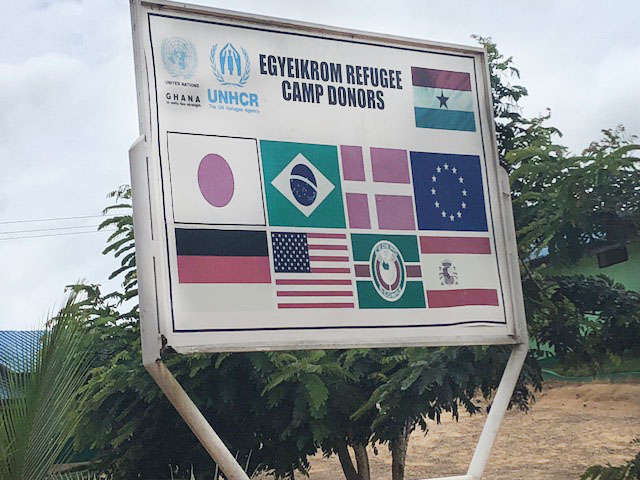 Written by Rev. Darryl Trimiew
Written by Rev. Darryl Trimiew
Disciples of Christ
With some measure of fear and trepidation, we went forth in faith to listen and learn from the Egyeikrom refugee camp staff and refugees. The camp was established by the Ghanaian government in 2011 to help, serve and resettle refugees from their neighboring country of Cote D’Ivoire. That country suffered a brutal civil war that forced citizens to flee. At the camp, we were greeted warmly by the camp administrator, but also by the people of the camp. Dressed in attractive Sunday go to meeting clothes the women we were there to meet proclaimed their faith in Jesus Christ and led us in prayer. Their enthusiasm and energy lifted our spirits as we sat down to listen to their life stories.
French-speaking in an English speaking country, they are struggling to establish small merchant exchanges. They live in modest cement homes that are well tended with small vegetable plots that supplement their diets. Small children were in attendance, but not school age ones as they were enrolled in public education where they learn English and other standard courses. The only men present were the leaders of the camp and NGO agencies doing work in the camp, and the 5 men of our 12 person delegation. The women told us that some men were off to worK or looking for work in the city, but they had also lost many of their husbands in the war in their home countries.
The refugees did share with us their frustrations in living in a foreign country, struggling to survive and to create better lives for their children. As adults they work hard selling small items in local markets, their effectiveness in doing so is limited by their limited English. While life is hard it is possible as Ghana does have among other amenities, free health care for all, a fact not lost upon us Americans. On the whole, these folks were resilient and hardworking and hopeful. They need some micro-economic grants that will help them to establish stronger and wider market sales. What is unclear is the future of the camp since our Ghanan hosts made it clear that refugees who go home are not readmitted as refugees. Equally daunting is the fact that there is not for them any easy path to Ghanaian citizenship. In short, these folks must solve their problems in Ghana and they must find a way to integrate into Ghanan society.
We must continue to pray with them, work with them, and work with Ghanaian Church partners in addressing their problems in this transitioning period. Such support begins with coming into solidarity with them as they are also co-workers in the faith. We then toured the camp which was well run and regulated. Poultry and eggs, in particular, are the most important commercial products. The school and other buildings are again modest but functional and the dominating impression is that the government does not coddle anyone, but also has not abandoned them.
Written by Dr. Audley and Mrs. Sharon Mackel
Our faithful pilgrimage journey to Ghana, continues from Accra to Ho today with travels north through plush greenery as we arose above sea level to the Volta region mountains of Ghana. Upon arrival in Ho we meet with Reverend Mrs. Nyuieme Ama Adiepena, National Women’s Programme Officer, our Global Ministries Evangelical Presbyterian (EP) Women Fellowship Partners and Jonathan Komladezei, Men’s Programme Director.
We visited The EP church Activity Center, which was started in 1998 by Madam Alice Stella Ayebi; initially a 6-month vocational training program, for pregnant girls from 17-18 years of age. Presently the program is 2 years, with 32 residential students away from there families and home. They are immersed in math, English, social skills and Health services, and most important skills that allow self-reliance and income generation such as dressmaking, crafts, catering, and baking.
We receive an enormously extravagant welcome to Wegbe Kpalime, Ghana by The Girls Empowerment Club (GEC). This is the second pilgrimage visit by Global Ministries to this site. The GEC program is a response to high pregnancy rate in this community, largely a result of sexual abuse and gender violence that is rising in prevalence in the young innocent and vulnerable Ghanaian school girls. The students spoke eloquently, present their welcome dance with African drumming and conveyed anthems and affirmations of self confidences, and leadership.
As partners of Global Ministries, both of the above programs have benefited from the contributions of OGHS (One Great Hour of Sharing) and Global Ministries. Looking forward, the EP plans include introducing computer skills training as the students learn in there closed isolated area, to become global citizens. Following cultural protocol, our delegation was honored to have the opportunity to meet with the Head of School of Wegbe Kpalime along with the Chief Wuiah Kees II of Wegbe Kpalime and community elders and teachers.
Our evening ended in darkness, with the melodious spiritual sounds and revival preaching aired through the Evangelical Church megaphones that could be seemingly heard throughout the Ho Region. The blessing of God.
It’s a hot, sunny day in Ho, Ghana. The streets are filling with people. Some are opening their sidewalk stores, young men are jogging in formation through the streets, and children are walking closely alongside their mothers. Others, however, are preparing for a funeral. Saturday is the day when Ghanaians celebrate the life and mourn the loss of loved ones who have joined the ancestors.
Our day would begin by traveling to the city of Peki where we would celebrate the legacy of Presbyterian missionaries who are beloved by many Ghanaians. Their ministry in Ghana began hundreds of years ago, however, their work to educate, build and uplift Ghanians has continued through the Evangelical Presbyterian Church and the extraordinary work under the supervision of the Reverend Ama, who would be our guide. Rev. Ama, a true adventurer, had quite a day planned for us. Her main goal was for all of us to climb the mountain where the missionaries had placed a cross so we could sign our names.
Felix, our skilled, courageous and fearless driver, began our journey to Peki, a small town nestled high in the mountains. This city which is in the Volta region, has a population of approximately 1000 people. To reach Peki, our sturdy van bus had to travel over curvy, cavernous, bumpy roads and climb high into the mountains. As we journeyed up the mountain, the beautiful canvas of the lush green mountainside, peppered with colorful houses and surrounding majestic mountains reaching into the clouds, took our minds off of the land that could be seen far below. After driving quite a ways up the mountain, we arrived at the home of Rev. Irene, who would share the history of the Presbyterian missionaries who came to Ghana in 1870 to spread Christianity.
According to Rev. Irene, the missionaries chose Peki because there were no mosquitoes in the area. Earlier missionaries who had settled near the ocean had died of malaria. Rev. Foray and his wife, who ventured to Peki, started the program for women. Mrs. Foray gathered the women together because she saw their struggles as they attempted to work and raise their families in harsh and extreme conditions. She taught them various skills such as sewing, baking, and making soap. To teach scripture, Mrs. Foray sang them in her attempts to help them learn the scriptures.” Rev. Irene further shared that Mrs. Foray’s approach was “holistic in that it was spiritual, social, and economic empowerment.”
In addition to empowering women, the Presbyterians opened a Teacher’s College that trained many people. Many teachers came out of the school as education was held in high esteem. Madame , Rev. Irene’s mother, stated that her grandfather was the first teacher.
Our brief history was cut short as our mountain guides had arrived. Edem and Maeutor, two young men, who were also teachers, would take us up the mountain. As we approached the mountain and saw the scale of the task, we all decided to be safe and leave the mountain climbing for others.
We journeyed on to Amedzore E.P. Church which sat on a hill surrounded by large snake plants and fern trees. This once thriving church had served the religious needs of the Peki community from 1889- 1984.
Day 6
Written by LaJuana Beasley
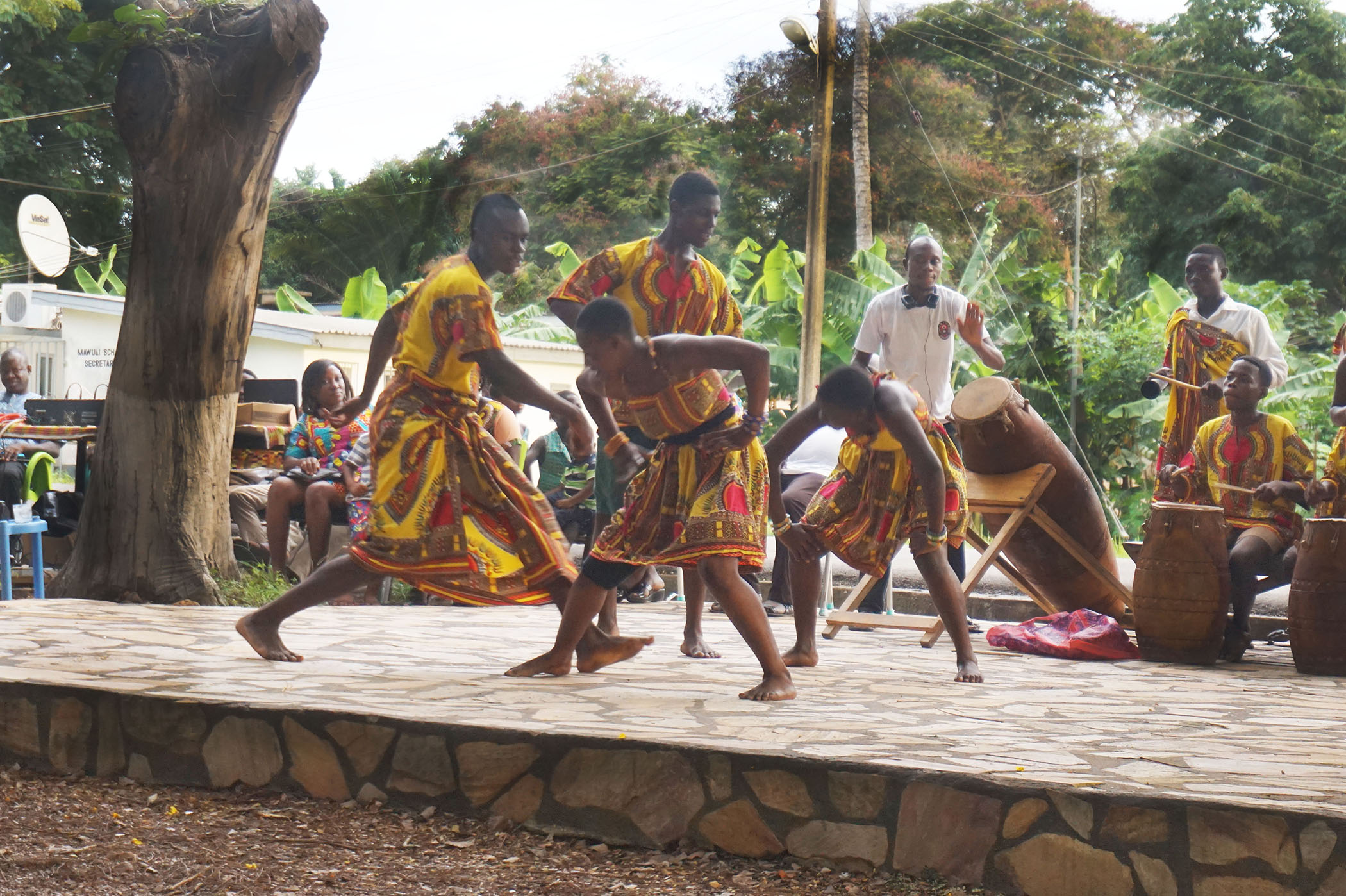 What a wonderfully climatic way to end our day.
What a wonderfully climatic way to end our day.
After traveling to the Hohoe Municipality, one of the 25 administrative districts of the Volta Region of Ghana, we witnessed the induction of Rev. A. K. Baltes as Synod Moderator Central Presbytery, we enjoyed a traditional meal of fufu, goat and rice with noodles.
The service was different, yet familiar and comforting, being as we were a long way from home. The songs, the prayers, the jubilation, the praise of God were felt even in the Ewe language. Praise God from whom all blessings flow!
We spent the afternoon at the Mawuli Senior High School in Ho, Ghana, which was established by the Evangelical Presbyterian (E.P.) Church. The school is still influenced by the church, but teachers are paid by the government. There were 2,570 students and approximately 250 school personnel at the school. The Drummer and Dance Troupe performed several dances, including one where they brought members of our delegation up to dance with them. The Drama Troupe presented a very entertaining skit. The acting was really good, and these were all performed and directed by the students.
The whole evening was uplifting even as I was reminded once again that children are children the world over. The joy I saw on the faces of the actors and the audience was infectious and made me smile.
God Bless the teachers, the children and the administration.
Related News
OGHS Travel
OGHS travel makes our work in the world through the United Church of Christ come alive. Listen to...
Read MoreOGHS and Global Ministries Delegation to Ghana
Our Pilgrimage to Ghana (September 23 - October 3) was very successful. Our group of 12 learned...
Read More
